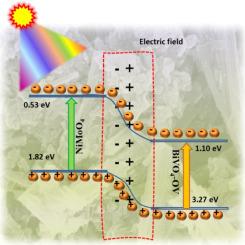揭示通过氧缺陷工程提高 p-n BiVO4-OV/NiMoO4 异质结光催化性能的新见解
IF 5.4
Q2 ENGINEERING, ENVIRONMENTAL
引用次数: 0
摘要
开发高效稳定的光催化剂对于快速有效地去除废水中的有毒污染物至关重要。本研究采用一步水热合成路线成功合成了富含氧空位的新型 1D/2D BiVO4-OV/NiMoO4 杂化物(BiVO4-OV/NiMoO4)。利用 p-n 异质结和氧空位,优化的 BiVO4-OV/NiMoO4 复合材料表现出优异的光催化效率,在可见光照射下,60 分钟内罗丹明 B(RhB)的光催化降解效率达到 92%。优化后的 BiVO4-OV/NiMoO4 复合材料的表观速率常数为 0.02864 min-1,分别是 BiVO4 和 NiMoO4 的 4.4 倍和 5.5 倍。通过活性物种捕获实验研究了 RhB 的光催化机理和降解途径。值得注意的是,优化后的 BiVO4-OV/NiMoO4 杂化物具有高稳定性和可回收性。该研究通过缺陷和异质结工程协同作用开发了高效可见光催化剂,为有机污染物降解提供了一种前景广阔的方法。本文章由计算机程序翻译,如有差异,请以英文原文为准。

Unveiling new insights into photocatalytic enhancement of p-n BiVO4-OV/NiMoO4 Heterojunctions through oxygen defect engineering
The development of efficient and stable photocatalysts holds vital importance in the fast and effective removal of toxic contaminants from wastewater. In this study, novel 1D/2D BiVO4-OV/NiMoO4 hybrid with enriched oxygen vacancies (BiVO4-OV/NiMoO4) were successfully synthesized by using one step hydrothermal synthesis route. Utilizing the p-n heterojunction and oxygen vacancies, the optimized BiVO4-OV/NiMoO4 composite exhibited exceptional photocatalytic efficiency, achieving a photocatalytic degradation efficiency of 92 % for rhodamine B (RhB) under visible light irradiation within 60 min. The apparent rate constant of value of optimized BiVO4-OV/NiMoO4 composite is 0.02864 min−1, exceeding those of BiVO4 and NiMoO4 by 4.4 times and 5.5 times, respectively. The photocatalytic mechanism and degradation pathways of RhB were investigated through active species trapping experiment. Remarkably, optimized BiVO4-OV/NiMoO4 hybrid demonstrated high stability and recyclability. This study on the development of highly efficient visible-light catalysts through synergistic defect and heterojunction engineering, offering a promising approach for organic pollutant degradation.
求助全文
通过发布文献求助,成功后即可免费获取论文全文。
去求助
来源期刊

Journal of hazardous materials advances
Environmental Engineering
CiteScore
4.80
自引率
0.00%
发文量
0
审稿时长
50 days
 求助内容:
求助内容: 应助结果提醒方式:
应助结果提醒方式:


